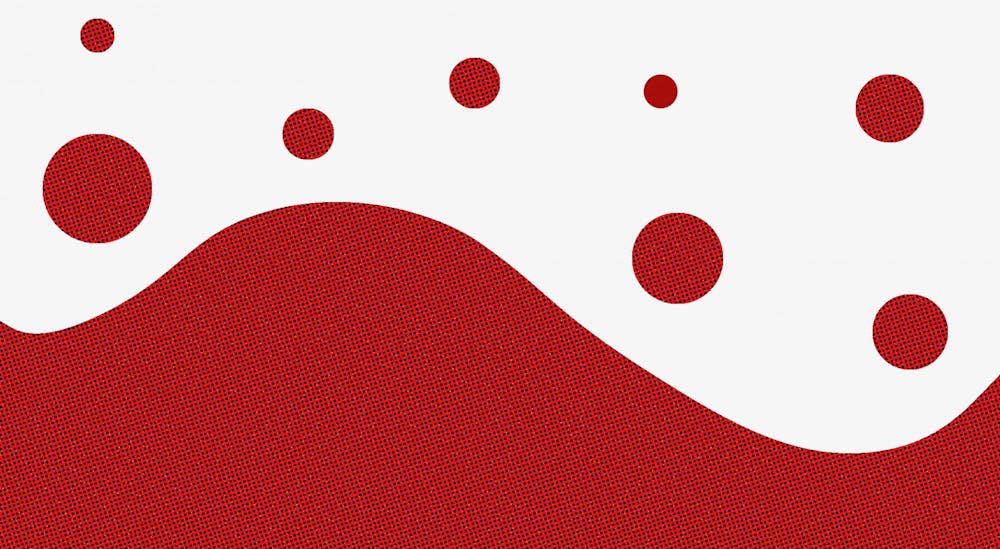A sharp pain jolted me upward from my comfortable position on my bed. When I stood up, it was like I had eaten a pound of rocks. I dragged my feet as I headed to the bathroom — it felt like my intestines were tangled around my bladder.
I sat down on the toilet seat and noticed my bright red underwear beaming back at me — except I didn't own any bright red underwear.
I'm too young, my 11-year-old self thought as I recalled "the conversation" I had with my mother a few months ago.
From that day, my period stalked me every month. It would appear at the most inconvenient times, like it was plotting against me.
Sometimes it would come when we had swimming days in P.E. in middle school. I would sit on a metal bench adjacent to the pool, watching as my classmates swam laps because I was too afraid to put a tampon in — I shuddered at morbid tales of toxic shock syndrome.
I held in the guilt of not being able to participate, but at least I wasn't alone. My friends also sat and watched. Supposedly, we were "synced" — whatever that meant.
I always felt like my period was just an inconvenience. Especially when I got my share of "Are you on your period?" or "She's PMS-ing."
When I got to high school, my perspective changed.
I was sitting in my freshman Hawaiian history class learning about the different houses of ancient Hawaiʻi. The hale peʻa stood out to me.
Before Hawaiʻi was colonized, a woman's period was considered sacred by her community. It was never frowned upon or embarrassing; it signified life and the next generation. Women were taken to the hale peʻa, or menstrual house, to care for themselves and rest until their periods were over.
While women were in the hale peʻa, they were restricted from taking part in outside activities and daily chores. Instead, they would weave lau hala — leaves of the hala tree — and make kapa — fabric. They were also often brought sweet, fatty foods.
Imagining myself in the position of my ancestors, I felt the guilt and discontentment wash away. Why should I feel bad about something so natural and important?
Colonization almost erased my culture from existence, and in its place came the Western way of thinking about periods, affecting the way we view, understand and treat women.
Blood, sweat and tears
Menstruation is the monthly shedding of the uterine lining. The bodies of menstruators — which can include cisgender women, transgender men, nonbinary people and intersex people — prepare for pregnancy every month. If no pregnancy occurs, menstrual blood, which consists of blood and tissue, flows from the uterus out through the vagina.
Premenstrual syndrome is the emotional and physical symptoms that some people feel before or during their periods. PMS is caused by the hormonal changes that the body experiences during the menstrual cycle.
Cramps are common during menstruation. The uterus contracts to remove the lining from the uterine wall, causing painful cramps that vary from person to person.
These normal, natural occurrences have led to menstrual taboos and period stigma — the stereotypes and shame surrounding menstruation perpetuated by Western society.
"There is still very much a stigma that exists that perceives menstruation as something that people should feel embarrassed about — that it is a bodily function that no one needs to hear about or wants to hear about, that it is in some ways dirty or gross," said Demetra Presley, executive director of Go With The Flow, an Arizona nonprofit that helps provide free menstrual supplies to students, low-income and homeless members of the community.
According to Breanne Fahs, a professor of disabilities studies and women and gender studies at ASU, period stigma stems from its framing by the patriarchy.
"Women's bodies have historically been constructed as dirty or gross or problematic, especially compared to men's bodies," she said. "It has been a complicated, tricky binary. So period stigma (has) been related to gender and the gendering of bodies for a long time. … Historically, women are seen as being associated with their bodies, and men being associated with their minds."
Presley added that this stigma stems from the politicization of periods.
"I think that it has a lot to do with the fact that cis women's bodies in general are a political playground," she said. "Unfortunately, they have become political fodder as far as people, elected representatives, politicians wanting to enact policies that really chip away at individuality and bodily autonomy.
"It's not surprising that periods have become a part of this," Presley said. "But unfortunately, when we have such a divide politically, we tend to look at not whether this is something that should be enacted, but something that we decide on on the basis of political party or political affiliation."
As a result, stigma, miseducation and myths — like menstrual synchrony — have plagued menstruators for generations.
Presley described period stigma as having an exponential domino effect.
"If we can't talk about periods, how are we ever able to talk about what it looks like when people don't have access to what they need? How are we able to have conversations that are well informed and comprehensive and inclusive? How are we to educate the next generation of menstruators about things that are common and not common when it comes to their cycles?"
Another result of this stigma is the misconception that there is a singular narrative about the ways menstruators view their periods, Fahs said. Some people associate their periods with the pain that comes with it, feeling debilitated during menstruation. Others feel joyful, relieved that they aren't pregnant. Others can have increased feelings of sexual desire.
The way people are introduced to the topic of menstruation matters a lot too, Fahs said, noting that some school sex education curriculum tells girls "very little about the process of menstruation, or why it might be kind of special, or why it might even be a good thing. And they tell boys almost nothing."
Girls with parents who talk openly about menstruation are more likely to have positive feelings about it, Fahs said, whereas those who come from a home where it was taboo have a harder time feeling positive about the complexities of menstruation.
"When I was little, my mom would talk about her period and how it's the worst thing ever," said Fatima*, a junior studying electrical engineering. "And I would feel so bad for her because she was literally bleeding. So when I first got it, I was scared. And my mom wasn't happy that I got it. I'm not sure why that was, but that's how it was."
Ever since then, she internalized the habit of keeping quiet about her period, especially around men.
Fatima, who is Muslim and was raised in a Middle Eastern household, said talking about periods in her culture isn't normal. This is how she was raised, how her parents were raised, and how their parents were raised.
"Traditional," she called it.
Blood pressure
Fatima said her period comes with bad cramps, cold sweats, vomiting and headaches. There have been times when her period would pester her until she surrendered, having to call off work or go home early.
But despite having what some would consider extreme period symptoms, Fatima has never utilized accommodations the University offers — not because she never needed them, but because she never knew they were an option.
"That's the socialization we give to people who menstruate," Fahs said. "It's like, you're allowed to have hard periods, but you're not allowed to ask for anything in response. You just are supposed to just endure.
"It's patriarchy and capitalism — capitalism teaches us to ignore the needs of our bodies."
The University says students can seek accommodations for menstruation in a few different ways.
"If a student's personal wellbeing is affected by any circumstance, including their period, they can seek support from ASU Health and Counseling, and with their permission, receive a letter from a provider outlining the impact," said Aaron Krasnow, associate vice president and director of ASU Counseling Services, in an email. "Students can then provide that letter to their faculty or the Dean of Students' office to seek accommodations."
Students can also seek accommodations through Student Accessibility and Inclusive Learning Services if they are substantially limited from doing major life activities like breathing, walking, talking, hearing, seeing, sleeping, caring for one's self, performing manual tasks, learning, communicating, interacting with others and working.
"Students are welcome to register with our office and speak with an Accessibility Consultant to determine if accommodations may be reasonable for their situation," Chad Price, director of SAILS, said in an email. This could include someone who is substantially limited by their period.
"Accommodations are determined on a case by case, course by course basis through an interactive process," Price said. "Depending on the accommodation requested, the interactive process may include the faculty member."
Menstrual products are also available in the bathrooms of main buildings on all four main ASU campuses as a result of an effort made by Undergraduate Student Government, ASU's Women's Coalition and University administrators.
However, at the end of 2021, the project slowed due to USG and University inaction and a lack of communication.
"I don't want to be mean or stuck up, but (menstrual products provided by the University are) not good quality," Fatima said. "And most of the bathrooms, from what I've seen, have only tampons instead of including pads. I use only pads, so I had to resort to using toilet paper because there weren't any (pads)."
Period poverty is when a menstruator lacks access to period products, Presley said. Period poverty can be attributed to and can mean numerous things. Presley said although schools and universities accommodate the needs of most students using the bathroom, when a student is menstruating, they may be left behind. Sometimes, menstruators only have toilet paper available in stalls.
The most common example of period poverty Presley sees is when someone can't afford products, but the phenomenon is more complicated than that.
"Period poverty, though, also extends to not having the support to manage your cycle, not having the information or knowledge to manage your cycle safely and in a way that is best for you, not having access to restroom facilities and other measures that are needed to keep the products that you do have access to safe and accessible," Presley said.
To combat period stigma, misinformation and poverty, Presley said the way people view and talk about periods in the West needs to change.
"We firmly believe in talking openly about periods, talking openly about what it looks like when folks don't have access to period products and the type of impact that can have on their ability to function every day," she said, "whether it's in the school setting, whether it's in the workplace, or if it's even just being able to engage in day to day basic activities."
*This source's last name was omitted for privacy.
Edited by Sam Ellefson, Camila Pedrosa, Alexis Moulton and Greta Forslund.
This story is part of The Spectrum Issue, which was released on April 5, 2023. See the entire publication here.
Reach the reporter at savannah.dagupion@gmail.com and follow @savdagupion on Twitter.
Like State Press Magazine on Facebook, follow @statepressmag on Twitter and Instagram and read our releases on Issuu.

Savannah is a senior studying journalism with a minor in English. This is her seventh semester with The State Press. She has also worked at the Lonely Planet and Write On Downtown.




